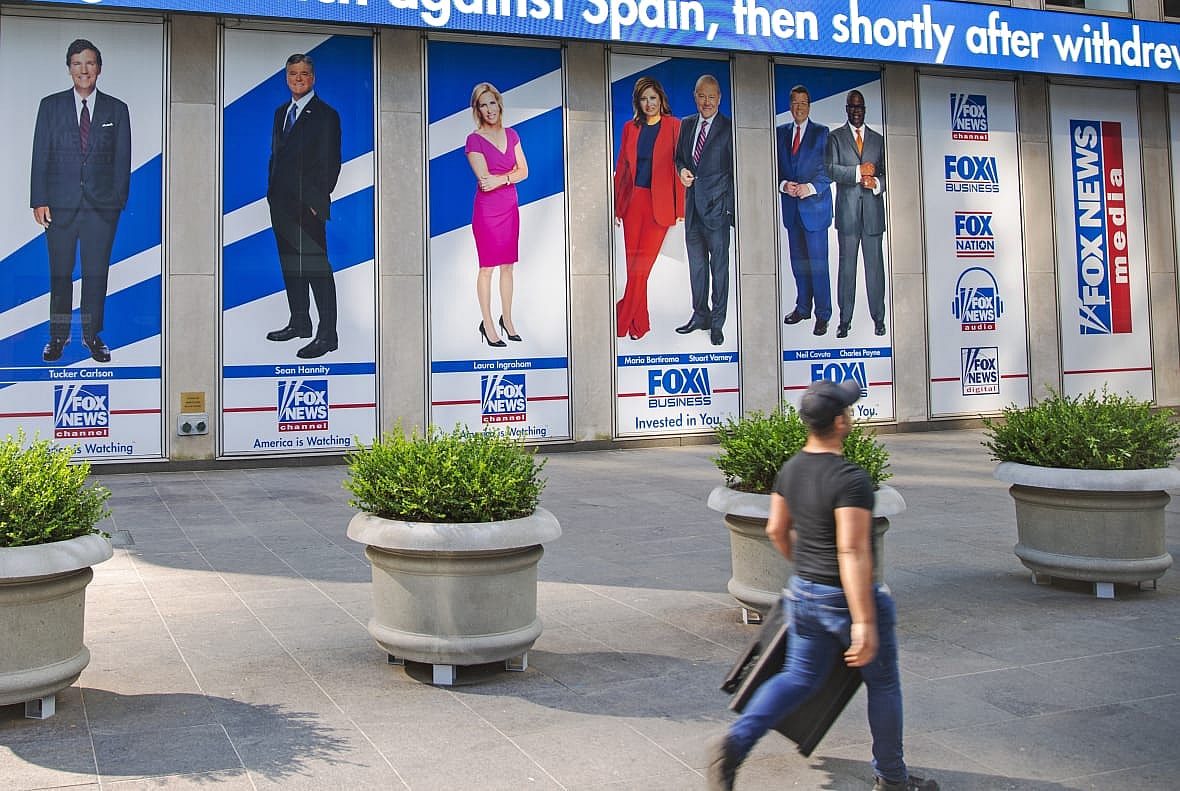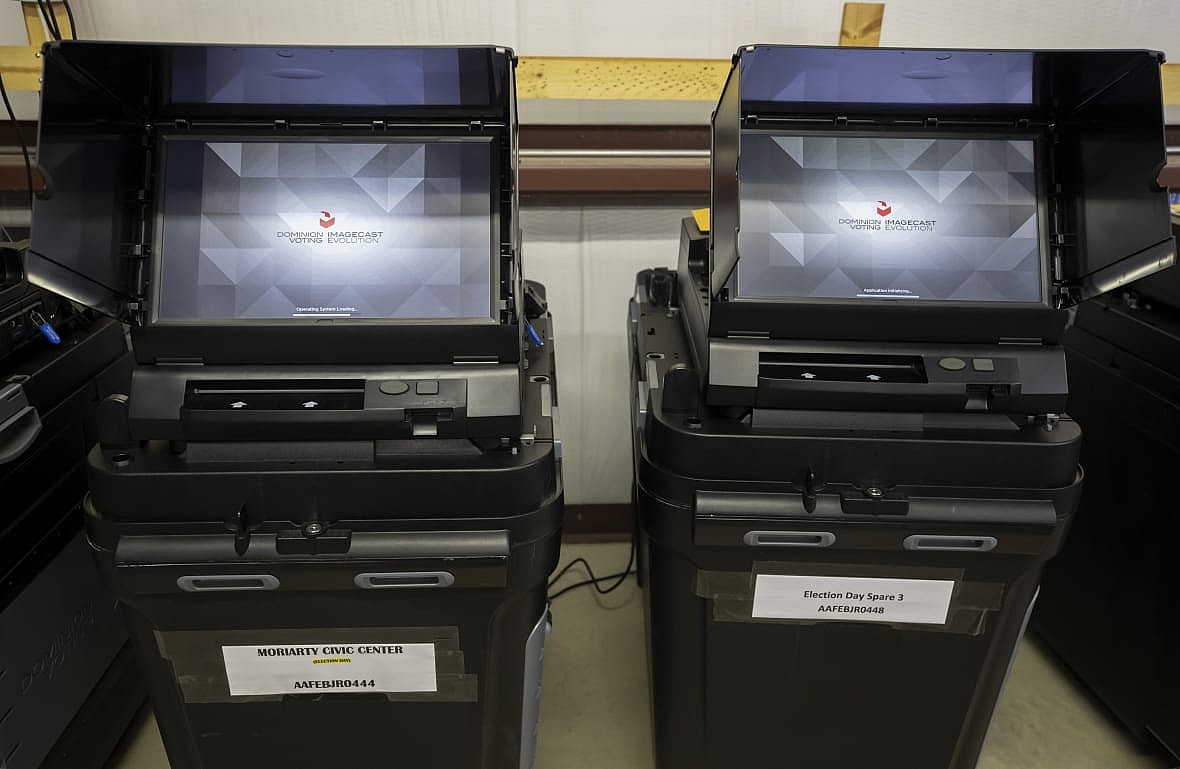Fox News is on an unlikely collision course with two leading contenders for the Republican presidential nomination over the rights of journalists.
In defending itself against a massive defamation lawsuit over how it covered false claims surrounding the 2020 presidential election, the network is relying on a nearly 60-year-old Supreme Court ruling that makes it difficult to successfully sue media organizations for libel.
Former President Donald Trump and Florida Gov. Ron DeSantis, two favorites of many Fox News viewers, have advocated for the court to revisit the standard, which is considered the foundational case in American defamation law.

“It is ironic that Fox is relying on a landmark case that was designed to help the news media play the watchdog role in a democracy and is under attack by Gov. DeSantis, Donald Trump and other figures who have been untethered in their attacks on journalists as enemies of the people,” said Jane Hall, a communication professor at American University.
Eye-catching evidence has emerged from court filings in recent weeks revealing a split screen between what Fox was portraying to its viewers about the false claims of election fraud and what hosts and executives were saying about them behind the scenes. “Sydney Powell is lying,” Fox News host Tucker Carlson said in a text to a producer, referencing one of the attorneys pushing the claims for Trump.
In an email a few weeks after the 2020 election, Fox Corp. Chairman Rupert Murdoch described a news conference featuring Powell and former New York City Mayor Rudy Giuliani, another attorney who pushed the election lies: “Really crazy stuff. And damaging.”
Aside from the revelations about Fox’s inner workings, the outcome could have broad implications for media organizations because of how they and the courts have come to rely on the libel law Fox is using as a shield.
In its $1.6 billion lawsuit, voting machine maker Dominion Voting Systems argues that Fox repeatedly aired allegations that the company helped rig the general election against Trump despite many at the news organization privately believing the claims were false.

Fox says the law allows it to air such claims if they are newsworthy.
In a 1964 decision in a case involving The New York Times, the U.S. Supreme Court greatly limited the ability of public officials to sue for defamation. It ruled that news outlets are protected against a libel judgment unless it can be proven that they published with “actual malice” — knowing that something was false or acting with a “reckless disregard” to whether it was true or not.
In one example of how the law was applied, editors at the Times acknowledged last year that an editorial mistakenly linked former Republican vice presidential nominee Sarah Palin’s rhetoric to an Arizona mass shooting. Palin lost her libel suit because she couldn’t prove the newspaper erred without concern for the truth.
Some advocates for free speech worry that the Dominion-Fox lawsuit ultimately could give a conservative Supreme Court a chance to revisit the standard set in the case, known as New York Times Co. v. Sullivan. While the case has been among the court’s most durable precedents, the newly empowered conservative majority has indicated a willingness to challenge what had been considered settled law — as it did last year in overturning abortion rights.
Two Supreme Court justices, Clarence Thomas and Neil Gorsuch, have publicly expressed interest in giving the precedent another look.
In dissenting from a 2021 decision not to take up a libel case, Gorsuch wrote that what began in 1964 as a decision to tolerate occasional errors to allow robust reporting “has evolved into an ironclad subsidy for the publication of falsehoods by any means and on a scale previously unimaginable.” He said the modern media landscape is much different today, and suggested it was less careful.
“My wish is that the parties would settle and this case would go away,” said Jane Kirtley, director of the Silha Center for the Study of Media Ethics and the Law at the University of Minnesota. “I don’t see any good coming out of it.”
A perceived strength in Dominion’s case also worries some supporters of the press.
Dominion says Fox was, in effect, torn between the truth that Joe Biden legitimately won the race and pleasing viewers who wanted to believe Trump’s lies. In depositions released last week, Murdoch argued that Fox as a network did not endorse the claims, but that some of its commentators — Maria Bartiromo, Lou Dobbs, Jeanine Pirro and Sean Hannity — at times did.

Murdoch was among several at Fox to say privately they didn’t believe the claims made by Trump and his allies that widespread fraud cost him reelection. In his deposition, Murdoch said he could have prevented guests who were spouting conspiracies from going on the air, but didn’t.
“One of the defenses is that even false speech about public figures is protected so long as it is believed by the speaker,” First Amendment attorney Floyd Abrams said. “But no one at Fox appears ready to say that he or she did believe the assertions … and there now appears to be substantial evidence that no one there at Fox did so. It’s a major blow.”
Fox’s entire prime-time lineup privately disparaged Trump lawyer Sidney Powell, according to court papers. Laura Ingraham, in a text to Carlson, called her a “nut.” In a deposition, Hannity said he did not believe her theories “for one second.” Nevertheless, Powell was interviewed on Fox 11 times between Nov. 8 and Dec. 10, 2020, according to court papers.
Dominion’s lawyers say Fox is arguing that it has no legal responsibility for broadcasting even the most horrible allegations, knowing they are false, as long as they are deemed newsworthy.
Fox said Dominion is presenting an extreme view of defamation, one in which the network had a duty not to report the allegations but to suppress them or denounce them as false.

“Under Dominion’s approach, if the president falsely accused the vice president of plotting to assassinate him, the press would be liable for reporting the newsworthy allegations so long as someone in the newsroom thought it was ludicrous,” Fox lawyers said in court papers.
“Such a rule would stop the media in its tracks,” Fox said.
There’s a high bar for proving libel — and that’s deliberate, First Amendment attorney Lee Levine said. Dominion has to show that a reasonable audience could conclude that someone at Fox was making these allegations, not just the interview subjects, he said.
Still, Levine said, Dominion has the strongest defamation case he’s seen in 40 years of being involved in the topic.
George Freeman, executive director of the Media Law Resource Center, said Fox should cite a lesser-known “neutral reportage” standard that dates back to a court case from the 1970s. It holds that news organizations should not be discouraged from reporting something newsworthy even if there are serious doubts about the truth, as long as that information comes from responsible and prominent sources.
But the U.S. Supreme Court has not weighed in on that argument, and a number of lower courts have rejected it. It’s also not clear that the defense would be legally applicable in the Dominion case against Fox.
There is sentiment in Republican circles that the Sullivan standard goes too far in protecting news organizations.
DeSantis last month urged the Supreme Court to revisit libel laws, saying they are used to smear politicians and discourage people from running for office. A bill being considered in the Florida Legislature would significantly weaken standards in the state. Trump said last year that the court should consider his own defamation lawsuit against CNN a “perfect vehicle” for revisiting precedents.
Some media law advocates that the University of Minnesota’s Kirtley has talked to privately, people who are usually eager to support the press in libel cases, are queasy about publicly backing Fox in the voting machine lawsuit.
Many see the case as a surrogate to hold Fox and Trump supporters accountable for what happened after the 2020 election, she said.
“I don’t think a libel suit is the vehicle to deal with this, and you have to think about what damage could be done to libel law if Dominion wins,” she said.
TheGrio is FREE on your TV via Apple TV, Amazon Fire, Roku and Android TV. Also, please download theGrio mobile apps today!

